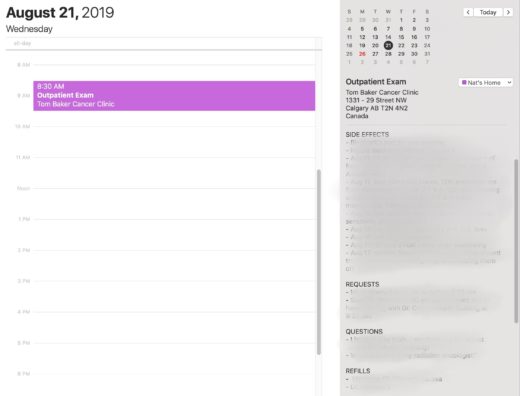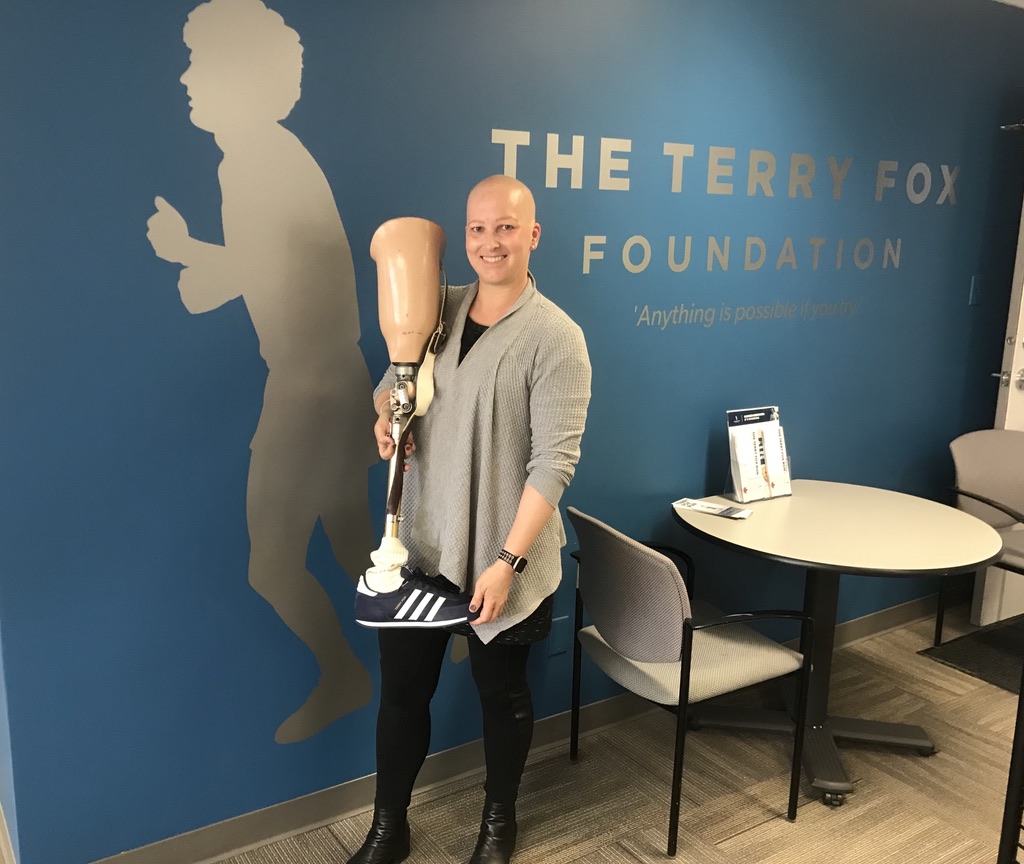Scenario 1
I was with my husband when I got the news from my General Practitioner (GP) doctor that I had stage 3 breast cancer. He referred me to the Calgary Breast Health Program, where I would meet with a surgeon and later, an oncologist. I did not know anything about breast cancer so before leaving, I asked my GP for a copy of my all of my results leading up to the diagnosis.
When the Breast Health Program called a few days later, an appointment was scheduled for the following week. I asked them what I should expect at my first appointment. I was told that I would meet my surgeon, who would discuss and agree on a treatment plan. Now that I knew what the agenda was, learned as much as I could about my diagnosis. I had about one week to research and understand as much as I could about my diagnosis and potential treatment. That included making sure I understood everything that was in my mammogram, ultrasound and biopsy reports. I only used reputable medical sources, cancer organizations or received information from individuals in the medical field from within my network to do my research.
Once I had a better understanding of my diagnosis. Then, I looked up typical treatment protocols for the type of cancer I had been diagnosed with. While I read protocols from other Canadian provinces, I ultimately made sure I had read every breast cancer document available on the Alberta Health Services Cancer Guidelines site. Having a ‘pre-med’ university background helped me with my understanding of a lot of the materials, and I found that some of the other Canadian jurisdictions presented the information in a more patient-friendly way. I found the Alberta site to be quite technical at times and geared more towards the physician than the patient. As I went along, I made sure I noted any questions I had.
By the time I met (accompanied by my husband for moral support) with my surgeon and oncologist, I was prepared for our conversations. I understood what she were telling me and I wasn’t overwhelmed with the information they were giving me. Because I was had done my research, I was able to ask well-informed questions, and I referred back to the questions I had jotted down to make sure I hadn’t missed anything. As a result, I was able to confidently make a decision on my treatment plan without second-guessing myself.
Lesson
For my appointments, like in business, if you are being invited to a meeting, ask for expected outcomes of the meeting. Ask if pre-meeting documentation is available (if applicable) and prepare yourself accordingly. If you are the meeting leader, send out an agenda and lay out the expectations of the meeting. If pre-work is required, ask for it at the time the meeting is set up. Too many times over the course of my career have I have found meetings to be unproductive because expectations weren’t set, data wasn’t available and subsequent meetings were then required.
Scenario 2
Once treatments started, I had many routine appointments for bloodwork, cancer treatments and follow-up appointments with my oncologist. Obvious patterns quickly emerged with each appointment type. Nurses always asked the same questions. So, instead of waiting for the nurse to ask them, I come in prepared with the information typed up. While that sounds like work for me, it actually isn’t. For example, I have to report all my side-effects, so I simply log them in the calendar notes for that specific appointment. Similarly, I do the same with all the medications I take. And, usually I always have something that I need from my doctor or nurse, so I have a list of requests, such as refills, questions or concerns I want to discuss. This makes it super easy. I simply print off a copy of the calendar appointment and give that to the nurse before meeting with the doctor. I also have a copy of it on my phone that I can also refer to.
As a result of doing this, an appointment that used to take 45 minutes, mostly driven by a nurse asking me questions, The nurse takes a couple of minutes to read them and ask any questions. She usually reads as she takes my blood pressure, so this easily shaves 5 to 10 minutes off my appointment time. She takes my printed notes, attaches it to her form and reviews it with the doctor. As the doctor examines me, we discuss my questions and concerns, since she already knows what they are, and before I am even done with my doctor, the nurse comes back with any needed prescriptions. As a result, my appointments are now about 30 minutes, instead of the initial 45 minutes.
Lesson
Look for opportunities to be more efficient with the routine or operational tasks, which allows you to focus on the most important items that need to be addressed. At the end of the day, it’s about being more productive and efficient with the time we have.
Did you like this post? If so, feel free to buy me a coffee or contribute towards some of my uninsured medical expenses.


